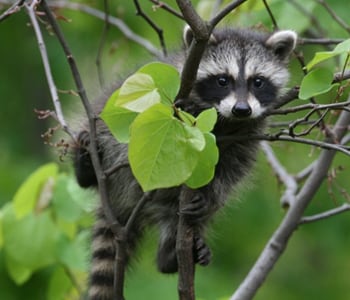Answering Your Springtime Wildlife Questions
March 30, 2021
Posted by Lake Erie Nature and Science Center

Spring is a time when everything is growing and bursting into life. Birds are singing, flowers are blooming, bees are buzzing and baby animals are starting to be seen.
As the weather warms and people spend more time outdoors, Lake Erie Nature & Science Center is here to answer your wildlife questions and concerns. Below, the Center’s wildlife experts answer some of the most common wildlife questions they receive from the public each spring.
I noticed a fawn alone in the grass. Is it abandoned?
Baby wildlife is rarely abandoned in nature. Mothers will often leave their young unattended for hours for a variety of reasons.
For instance, a fawn lying quietly by itself is perfectly normal. Deer do this to protect their young, as the presence of an adult would attract the attention of predators. Raccoons and squirrels will frequently retrieve their babies when they end up out of the nest too early. They often maintain more than one nest or den site and will move their babies as needed.
There is a rabbit’s nest in my yard. Should I move them?
Eastern Cottontail Rabbits often build their nests in yards and open spaces. If you stumble across one, do not move the bunnies because their mother will be unable to find them. She will return at dusk and dawn to feed and groom her babies.
Baby animals are vulnerable, yet resilient. Pets, predators and automobiles are all a natural part of their urban and suburban environments. Baby wildlife must grow up among these circumstances in order to learn how to successfully co-exist with them. Growing up in the wild is dangerous, but removing animals from their parents can be equally as detrimental to their survival.
I see a baby bird that can’t fly. Should I help it?
A baby bird with skin still visible or only covered in downy feathers should be placed back in the nest or in an artificial nest. If fully feathered but unable to fly, the bird is a fledging that should be left alone as it is in the process of learning critical survival behaviors.
A common myth is that wild animals will abandon their babies due to the scent of humans. In fact, most birds have little sense of smell. While mammals have a strong sense of smell, human scent will not cause wildlife to abandon their hormonal and maternal behaviors.
A baby squirrel fell from a tree. Should I feed it?
Squirrels often maintain more than one nest site and will retrieve their babies when they end up out of the nest too early.
Baby wildlife will never receive the same quality of care from humans as they would receive from their natural parents. Each species requires a specialized diet, and feeding an animal the wrong food can be harmful to its health. Human care can cause serious damage to the animal and should be seen as a last resort.
If you have questions about baby wildlife this spring, please contact Lake Erie Nature & Science Center at 440-871-2900 x204 or wildlife@lensc.org before intervening.

